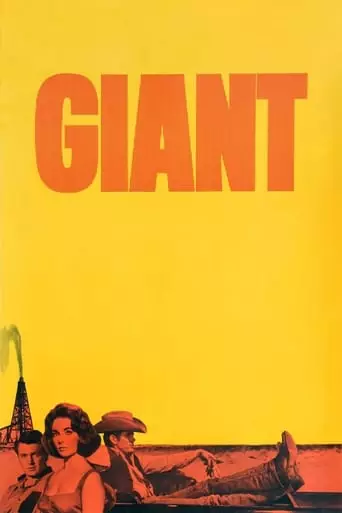
Giant (1956) Watch Online Free
Wealthy rancher Bick Benedict and dirt-poor cowboy Jett Rink both woo Leslie Lynnton, a beautiful young woman from Maryland who is new to Texas. She marries Benedict, but she is shocked by the racial bigotry of the White Texans against the local people of Mexican descent. Rink discovers oil on a small plot of land, and while he uses his vast, new wealth to buy all the land surrounding the Benedict ranch, the Benedict’s disagreement over prejudice fuels conflict that runs across generations.
Giant, directed by George Stevens and based on Edna Ferber’s novel, is an epic tale of love, family, and societal transformation. Set against the vast backdrop of Texas, the film chronicles the life of the Benedict family over several decades, highlighting their struggles with changing cultural values, racial prejudice, and personal ambitions.
The story begins in the 1920s with Jordan “Bick” Benedict (Rock Hudson), a wealthy Texan rancher, traveling to Maryland to purchase a stallion. There, he meets and marries Leslie Lynnton (Elizabeth Taylor), an independent and forward-thinking woman. The couple returns to Bick’s sprawling ranch, Reata, where Leslie faces challenges adjusting to Texas’s patriarchal and racially segregated culture.
The narrative explores the dynamics between Bick, Leslie, and Jett Rink (James Dean), a brooding ranch hand who later strikes oil and becomes a wealthy yet deeply unhappy tycoon. As the years pass, the film examines the Benedicts’ evolving family dynamics, Bick’s eventual reckoning with his prejudices, and Jett’s tragic pursuit of unfulfilled desires.
One of the film’s most powerful subplots is its critique of racism, particularly the discrimination faced by Mexican Americans in Texas. Leslie’s advocacy for the underprivileged workers on the ranch contrasts sharply with Bick’s initial indifference, leading to a poignant transformation in his character. The climactic diner scene, where Bick defends his Mexican-American daughter-in-law and grandson, symbolizes his moral growth and the film’s call for equality.
Leslie’s character challenges the traditional gender norms of her time. Her assertiveness and refusal to conform to patriarchal expectations create tension with Bick but ultimately lead to mutual respect. The film’s portrayal of Leslie as a progressive force underscores the importance of women’s empowerment.
Through Jett Rink’s rise and fall, the film critiques the emptiness of material success without emotional fulfillment. Jett’s wealth and power fail to bring him happiness, serving as a cautionary tale about the perils of unchecked ambition.
Giant juxtaposes the old Texas ranching culture with the emerging oil industry, symbolizing the broader societal shifts in mid-20th-century America. The film explores how individuals and communities grapple with change while holding onto traditions.
Giant was groundbreaking in its time for addressing issues of racism and sexism, themes that were rarely explored in mainstream Hollywood films of the 1950s. Its epic scope, powerful performances, and social commentary cemented its status as a classic. The film also marked James Dean’s final screen appearance, adding to its historical significance.
Watching Giant is an emotionally enriching experience. You may feel a mix of admiration for its bold storytelling and introspection about the issues it raises. The film’s exploration of prejudice and personal growth can leave a lasting impression, encouraging viewers to reflect on their own values and the societal progress still needed. Additionally, its sweeping visuals and heartfelt performances evoke a sense of nostalgia for a bygone era while celebrating the enduring human spirit.
Giant is a monumental achievement in American cinema, blending personal drama with social critique. Its timeless themes, stellar performances, and epic scope make it a must-watch for anyone interested in classic films that challenge societal norms while telling a compelling story
